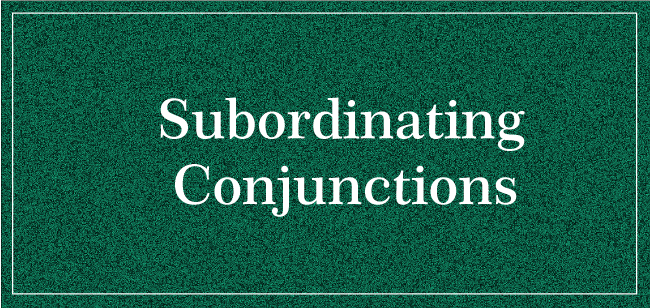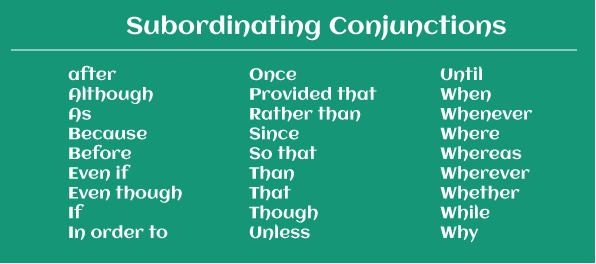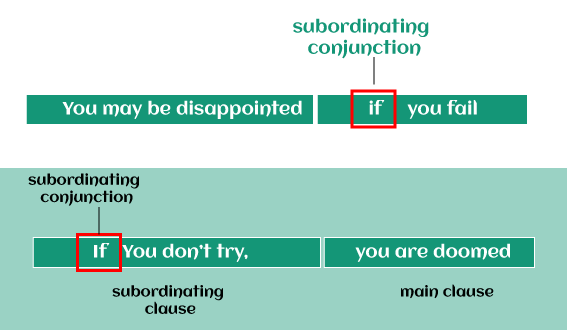Subordinating ConjunctionSubordinating conjunctions are the most challenging to recognize among the three types of conjunctions (i.e. coordinating, correlative, and subordinating). However, it doesn't mean that these are difficult to master. In fact, you probably utilize them without even knowing that they are subordinating conjunction. Let's look more closely at them to figure out more about them. 
What is a subordinating conjunction?A subordinating conjunction is a term or phrase that connects two clauses, one dependent and one independent. This word or phrase implies that a clause has informational value to add to the primary concept of the sentence, indicating a cause-and-effect correlation or a time and place transition in between two sentences. An independent clause can serve as an autonomous sentence, with no dependency. To put it in another words, this clause does not require any extra details in order to function as an independent sentence. An instance of an independent clause is the statement, "The kid failed the exam." A dependent clause supplements the main clause with additional details. These clauses are not self-contained, and their meaning is based on the independent clause. They are not full sentences. For example, "Because she did not prepare." A complete notion has been communicated, and sufficient information has been provided to completely explain the thought. What was the connection between the two clauses? The phrase "because." That gives us our first subordinating conjunction. However, if we merge the two clauses, we get "The kid failed the exam because she didn't study." These crucial words and phrases, also known as subordinators or subordinate conjunctions, might introduce adverb clauses. 
Importance of Subordinating ConjunctionSubordinating conjunctions are necessary components of complex sentences that contain a minimum of two clauses, one of which is primary (independent) and the other subordinate (dependent). When it comes to employing subordinate conjunctions, there is only one guideline to remember:
As an example: We glanced in the steel jar, where Gia often hides her sweets. Subordinating conjunctions that demonstrate cause and effect "Because" is the most basic subordinating conjunction. "Because" is single-purpose conjunction used to demonstrate a cause-and-effect relationship between a subordinate and major clause. A phrase beginning with because is insufficient on its own. Because he refused to wear a safety belt. We have the impression that something else is missing here. Let us add an independent clause to give this sentence some heft. Jason was no longer permitted to ride in the Roadster. Now we'll put the two together in a complex sentence. Jason was no longer permitted to ride in the Roadster because he refused to wear a seat belt. A clause of purpose is one that establishes a causal relationship, such as "because he/she did not wear a seat belt" (addressing the question "Why?" or "For what reason or cause?"). For, as, since, though, due to, provided that, because of, unless, and so/so that are some other subordinating conjunctions which can demonstrate cause-and-effect relationships and act in a similar manner.
Subordinating Conjunctions Indicate Correlations of Time or PlaceAnother utilization of subordinating conjunctions is to demonstrate a link between two phrases involving a time or place change. Once, while, when, wherever, before, and after are some instances of subordinating conjunctions.

How to Create a Subordinate ClauseIt is as simple as inserting subordinating conjunction to the start of a dependent sentence to build a subordinate clause. Then, pick whether you want the main clause or the subordinate clause to occur first. The independent phrase "they'll have a lunch on Friday" can be changed by the dependent clause "it pours" using the conjunction unless: "They'll have a lunch on Friday unless it snows." Said group is betting on Friday's weather for lunch, and because the main clause precedes the sentence, the conjunction comes after it (prior to the dependent clause). A main supportive clause must accompany if the sentence begins with conjunction and then a dependent clause. Both phrases have the same meaning, but in this case, the attention is shifted significantly more to the clause that occurs first. Subordinating Conjunctions and Comma PlacementSubordinating conjunctions in the midst of a sentence is not usually accompanied by a comma. This is the inverse of the concept applied in case of coordinating conjunctions, which are terms that connect two separate clauses (for, and, nor, but, or, yet, and sometimes so). Whenever a subordinate clause begins a statement, the entire clause (not just the subordinating conjunction) is separated by a comma. Incorrect: Whenever, Raj was away, Robert drove the car. Correct: Whenever Raj was away, Robert drove the car. Incorrect: Robert drove the car, whenever Raj was away. Correct: Robert drove the car whenever Raj was away . List of Subordinating ConjunctionsThere are numerous subordinating conjunctions in Grammar. In a list of subordinating conjunctions, let us check the most prevalent ones, with the help of some of the instances: After - It indicates a subsequent time period.
Before- It demonstrates an earlier time period.
Because - It implies the reason for that
If - It implies in the event that
Once- It implies at the moment when
So- It means in order to
Until- Implies upto that time
Although - It refers to in spite of something
Where- It implies the place or position.
These are some of the subordinating conjunctions. There are several other including- That, unless, until, before, after, if, when, whenever, wherever, as, as if, though, that, so that, now that, as soon as, as long as, and so on. When the dependent clause occurs prior to an independent sentence, there is a comma between the two, signaling the start of the independent clause. However, when the independent clause occurs first, there is frequently no need to split the two parts with a comma. Recognizing and Applying Subordinating ConjunctionsTip #1: Change up the order of your subordinating conjunctionsUsing subordinating conjunctions to build complicated sentences is an excellent technique to improve your writing! Utilize the flexibility of dependent clauses by rearranging your phrases so that you have some sentences beginning with the independent clause and others beginning with the dependent clause. Tip #2: Conjunctive Adverbs vs. Subordinating ConjunctionsConjunctive adverbs and subordinating conjunctions are frequently confused. Conjunctive adverbs join two independent clauses, whereas subordinating conjunctions link the dependent clauses with the independent clauses. Look for full concepts when reviewing the connecting clauses. Subordinating conjunction will be used as the connecting word because a dependent clause cannot exist independently. I have a lot of pending work because I was not finishing my work on time. "Because I wasn't finishing my work on time," in this sentence, is a dependent clause that uses the subordinating conjunction "because" to add specifics to the independent clause. "I have a lot of pending work." I wasn't finishing my work on time; consequently, I had a lot of pending work today. While communicating the same broad meaning, this example employs the conjunctive adverb "consequently" to connect the independent clauses "I wasn't finishing the work on time" and "I had a lot of pending work today." Both clauses have equal value and importance. Tip #3: Make very sure there is a dependent clause when searching for subordinating conjunctionsSome words that are employed as subordinating conjunctions are also utilized in other parts of speech. Finding the subject and verb in the statement you're connecting to the independent clause is useful for checking for dependent clauses. Since they rely on an independent sentence to fulfill the idea, dependent clauses sound incomplete. I ultimately could take a rest after I went shopping all day. "After" is subordinating conjunction in this statement. Since it has a subject and a verb, "after I went shopping all day" is a clause, but it is not a full sentence. It appears to be incomplete and requires more information. I ultimately could take a rest. In this statement the term, "after" is a preposition as the statement lacks a subject or the verb in it, so it is not a clause but a prepositional phrase. ConclusionLike any other grammatical technique, subordinating conjunctions can become repetitive and uninteresting if used too frequently. Of course, some sorts of writing necessitate a bare-bones style with no flavor. However, subordinating conjunctions should be used with caution. Using the same device again and over again sounds not only rote but also like the work of an incompetent writer. So, expert writers understand that these conjunctions must only be utilized when absolutely necessary.
Next TopicConjunction Exercises
|
 For Videos Join Our Youtube Channel: Join Now
For Videos Join Our Youtube Channel: Join Now
Feedback
- Send your Feedback to [email protected]
Help Others, Please Share









